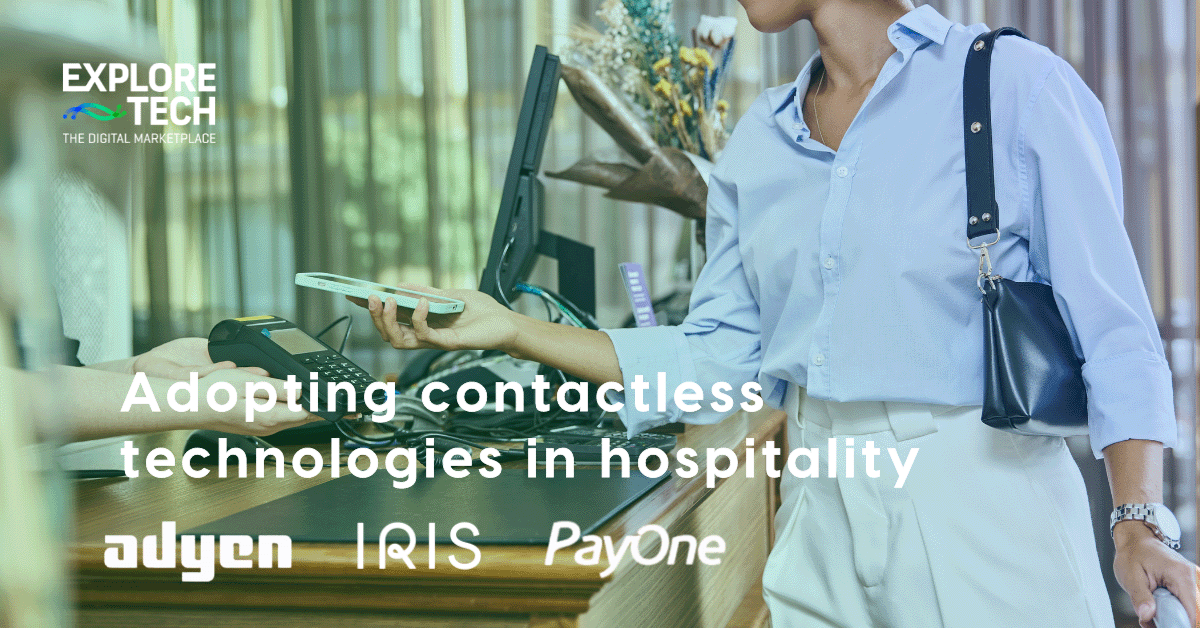

The hospitality industry is undergoing a significant transformation with the accelerated adoption of contactless technologies. This shift is driven by a growing demand for enhanced guest experiences and streamlined operational efficiency. Contactless solutions are no longer just a response to health concerns but have become integral to modern hospitality strategies.
As hotels and resorts strive to meet the evolving expectations of tech-savvy travelers, the implementation of contactless technologies offers substantial benefits. This article delves into the latest advancements in contactless technology and their impact on the industry. It features insights from industry experts, including Kate Fuller from IRIS, Tjalling van den Burger of Adyen, and PayOne’s Mohammad Izwayyed, who provide a comprehensive look at how these technologies are reshaping guest interactions, improving operational processes, and setting new standards for service excellence. Their expert perspectives highlight the transformative power of contactless solutions and offer valuable guidance for hotels aiming to stay ahead in an increasingly competitive market.
Benefits of Contactless Technology
Contactless technology provides a range of benefits that enhance both guest experiences and hotel operations. For guests, it offers increased convenience and flexibility, allowing them to interact with hotel services in a seamless and efficient manner. For hotel operators, it improves operational efficiency by streamlining processes and reducing manual tasks. This technology not only simplifies transactions and interactions but also supports a more hygienic and user-friendly environment. As hotels continue to embrace contactless solutions, they are able to meet the evolving needs of their guests while optimizing their internal operations.
One of the primary advantages of contactless technology is the flexibility and convenience it provides. Kate Fuller from IRIS explains, "Our mobile ordering technology allows guests to review, order, and pay for items from their own devices at any time and location. This flexibility leads to greater accuracy, less friction, and swifter delivery of orders, ultimately improving guest experiences and boosting revenue by 20-40%."
PayOne’s integrated payment solutions further streamline operations by automating reconciliation processes, reducing manual tasks, and lowering fraud risks through tokenization. PayOne’s Senior Manager of Products, Mohammad Izwayyed mentions that by simplifying payment processes with solutions like "Pay@Reception" and "Pay-By-Link," transactions become more secure and efficient for both guests and hotel operators.
According to Adyen VP Enterprise,Tjalling van den Burger, Adyen provides a seamless payment experience across various platforms and regions, ensuring that hotels can offer contactless payment options without disruption. Their expertise in integrating new payment solutions with existing systems helps hotels overcome legacy system challenges, ensuring a smooth transition to modern, contactless operations.
Recent Advancements in Contactless Technology
The hospitality industry is experiencing remarkable advancements in contactless technology, driven by the demand for seamless, efficient, and secure guest experiences. These innovations are continually evolving to meet the industry's changing needs, offering enhanced convenience and streamlined operations. The focus on developing and implementing state-of-the-art solutions reflects a commitment to improving guest interactions and operational efficiency, ensuring that hotels can provide a modern and responsive service environment. As these advancements progress, they are setting new standards for excellence in the hospitality sector.
Mobile and in-app check-in experiences are becoming more common, allowing front desk staff to focus more on guest interactions. This trend is particularly beneficial for business and budget hotels that cater to guests who prefer a quick and seamless check-in and check-out process.
According to Kate Fuller, IRIS’s mobile ordering solutions are driving significant revenue increases by enabling guests to place orders from anywhere within the property. Their digital guest directories and in-room tablets provide a comprehensive and interactive way for guests to access hotel information and services, enhancing their stay.
“PayOne’s integrated payment solutions automate reconciliation and minimize manual processes, enhancing both guest experiences and operational efficiency. The introduction of digital room keys and IoT-enabled smart rooms, powered by PayOne’s secure payment technologies, enhances guest convenience and improves energy efficiency,” assures Izwayyed.
Adyen’s seamless payment solutions cater to the growing demand for digital and contactless transactions. By integrating with various platforms, they enable hotels to offer a unified and secure payment experience across different regions. "Our expertise in handling complex payment ecosystems ensures that hotels can adapt to the latest technological advancements without compromising security or efficiency," says van den Burger.
Improving Guest Experiences and Operational Efficiency
Contactless technology profoundly improves both guest experiences and operational efficiency. By integrating these advanced solutions, hotels can deliver more personalized, efficient, and secure services, enhancing overall guest satisfaction. The adoption of contactless technologies enables hotels to streamline operations, reduce manual tasks, and provide a higher level of convenience and safety. This shift towards modern technology not only meets the growing expectations of today's travelers but also supports more effective and seamless hotel management practices.
Multiple check-in options, including mobile check-in and self-service kiosks, have been successfully implemented in many hotels, allowing guests to bypass queues and enjoy a seamless experience. Contactless payments via wearable devices further improve the overall guest experience by allowing them to enjoy amenities without carrying wallets, cards, or phones.
IRIS’s solutions, such as mobile ordering and digital guest directories, streamline operations by reducing the need for physical interactions and printed materials. This not only enhances the guest experience but also supports sustainability initiatives. "Our digital solutions replace traditional in-room directories and menus, reducing paper waste and ensuring guests always have up-to-date information," explains Fuller.
Streamlined payment processes and reduced operational overheads are additional benefits of contactless technology. PayOne’s solutions, such as "Pay@Reception" and "Pay-By-Link," simplify reconciliations and lower fraud risk through tokenization, enhancing security and efficiency. Automated reconciliation and secure data exchange cut staff time spent on manual tasks, allowing finance teams to focus on strategic activities and reducing errors, points out Izwayyed.
Adyen’s comprehensive payment platform supports various contactless payment methods, ensuring that guests can choose their preferred mode of payment. This flexibility enhances guest satisfaction and streamlines operations. van den Burger highlights, "Our solutions are designed to integrate seamlessly with existing hotel systems, providing a consistent and secure payment experience across all touchpoints," assures van den Burger.
Challenges and Solutions in Adopting Contactless Technology
While the benefits of contactless technology are clear, hotels face several challenges when adopting these solutions. Overcoming these challenges requires careful planning, integration, and ongoing support. Companies like IRIS, PayOne, and Adyen offer innovative solutions that address these challenges, helping hotels transition smoothly to contactless operations.
Legacy payment systems can hinder progress, but integrating new solutions with current and future tech ecosystems can ensure a smoother transition. Adyen’s ability to integrate new payment methods with existing systems helps hotels overcome technological barriers, ensuring a seamless transition to contactless operations. "Our platform is designed to work with a variety of legacy systems, making the integration process as smooth as possible," says van den Burger.
Ensuring seamless integration and user-friendly experiences is crucial. Direct POS integration, as seen with IRIS, enhances operational efficiencies by automatically delivering orders to the kitchen or bar, freeing up staff time and reducing customer wait times. "Our integrated solutions ensure that guest orders are processed quickly and accurately, enhancing overall satisfaction," explains Fuller.
Data privacy and security are significant concerns when implementing contactless technologies. PayOne’s solutions address these issues through advanced encryption and tokenization methods, ensuring that guest information remains secure. "We conduct regular security audits and updates to mitigate potential vulnerabilities, providing peace of mind for both guests and hotel operators," states Hmade.
Case Studies of Successful Implementation
Several hotels have successfully implemented contactless technologies, setting benchmarks for the industry. These case studies highlight the practical benefits and successful outcomes of adopting solutions from IRIS, PayOne, and Adyen.
The Mandarin Oriental Hotel Group has integrated mobile check-in, digital room keys, and in-room tablets across its properties, resulting in improved guest satisfaction scores and operational efficiencies. Similarly, the Four Seasons has adopted a comprehensive mobile app that allows guests to manage every aspect of their stay, from check-in to room service and concierge requests, all from their smartphones.
In the Middle East, the Jumeirah Group has embraced contactless technology to enhance guest experiences. Their properties feature digital concierge services, allowing guests to request amenities, make reservations, and receive personalized recommendations through a mobile app. This not only streamlines guest interactions but also enables them to offer tailored experiences based on guest preferences and behaviors.
IRIS’s technology has been successfully implemented in several high-profile hotels, enhancing guest experiences through mobile ordering and digital directories. These solutions have not only increased guest satisfaction but also boosted operational efficiency and revenue.
PayOne’s payment solutions have been adopted by numerous hotels worldwide, simplifying payment processes and enhancing security. Their tokenization and automated reconciliation features have reduced fraud risks and operational overheads, allowing hotels to focus on delivering exceptional guest experiences.
Adyen’s expertise in seamless payment integration has helped hotels worldwide transition to contactless operations smoothly. Their solutions ensure that guests can enjoy a consistent and secure payment experience across all touchpoints, enhancing overall satisfaction.
The Future of Contactless Technology in Hospitality
Looking ahead, contactless technology is set to play a crucial role in shaping the future of the hospitality industry. The ongoing innovations and growing adoption of these technologies will drive significant changes in how hotels operate and interact with guests. As new solutions continue to emerge, they will enhance guest experiences and streamline hotel operations, setting new benchmarks for efficiency and service excellence. This evolution promises to transform the hospitality landscape, offering both guests and operators advanced tools for a more connected and responsive experience.
Mobile ordering and digital guest directories from companies like IRIS will continue to enhance guest experiences and drive revenue growth. Advancements in mobile check-in, digital room keys, and smart room controls will further streamline operations and elevate guest satisfaction.
As the industry evolves, operators must deliver dynamic, engaging experiences that offer choice, convenience, and exceptional service. By adopting agile and innovative contactless solutions from leaders like PayOne and Adyen, hotels can optimize operations, enhance guest experiences, and stay competitive in the ever-changing hospitality landscape.
Moreover, the integration of virtual reality (VR) and augmented reality (AR) into contactless systems promises to revolutionize the guest experience by providing immersive and interactive features that enhance engagement and satisfaction. As these technologies become more prevalent, they will offer new opportunities for personalization and guest interaction.
Conclusion
The adoption of contactless technologies in the hospitality industry represents a significant advancement in how hotels interact with guests and manage their operations. By leveraging solutions from IRIS, PayOne, and Adyen, hotels can enhance guest experiences, streamline operations, and stay ahead in a competitive market. The future of hospitality is undoubtedly shaped by the ongoing evolution of contactless technology, promising more efficient, secure, and personalized services for travelers around the world.


.png)


.png)
